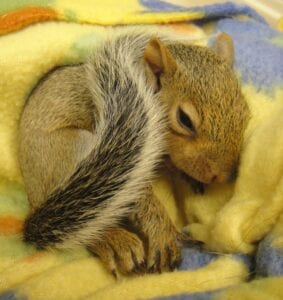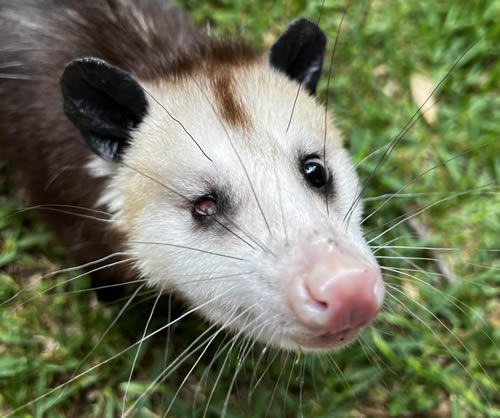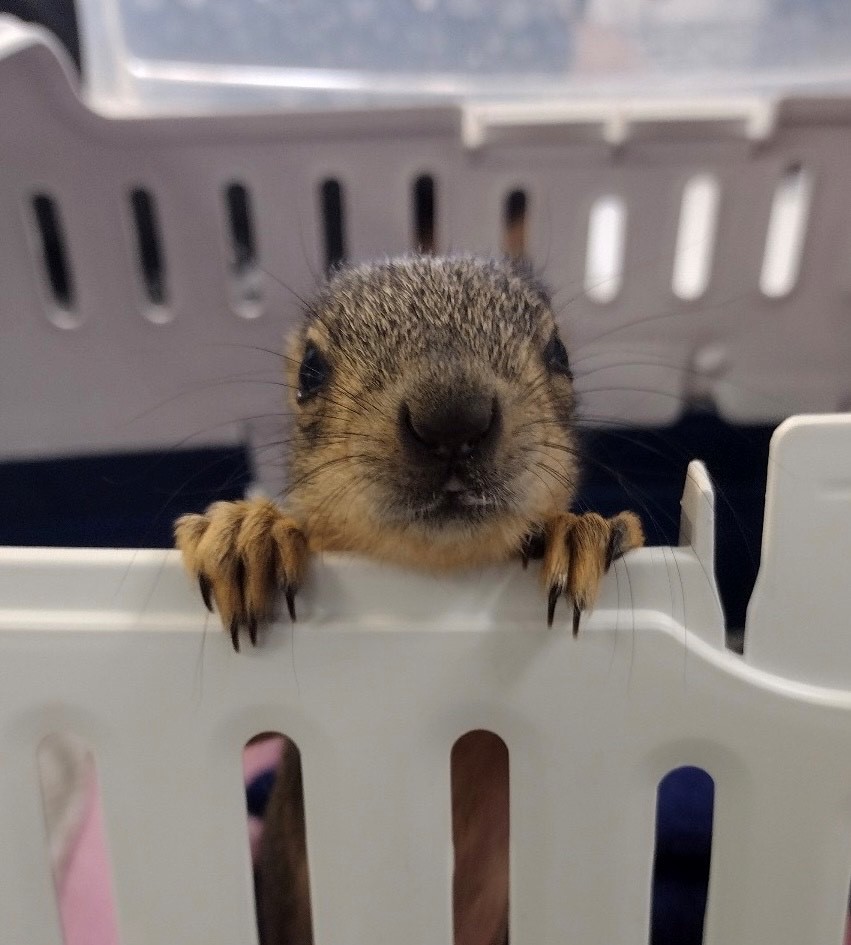 Have you found a BABY squirrel?
Have you found a BABY squirrel?
If the baby’s eyes are closed and it moves around on its belly, you can attempt to reunite the baby with its mother. Please do not attempt this if the baby is:
- Injured
- Caught by a cat/dog/hawk
- Flies are circling
- Dehydrated (pinch the skin on its back and if it does not return to its original shape within one second then it is dehydrated)

Reuniting Instructions:
- Prepare a shallow box to put the baby in by placing a heat source and soft cloth in the box. You can use a rice sock or water bottle heated up in the microwave until warm as a heat source. Make sure the cloth is between the heat and baby, or the baby may get burned.
- Place the baby in a shallow box at the base of the tree, closest to where it was found. Make sure the box is off the ground so ants can’t get into it (set it on a chair or nail it to the tree).
- Play this video of a Baby Squirrel Cry from your phone and place it next to the box. Quickly go back inside (or back very far away if you are not at home).
- Leave the video on loop for 15 minutes. After 15 minutes, remove the phone for 30 minutes. Repeat looping the video for 15 minutes and removing the phone for 30 minutes.
- Give the mother four hours to retrieve her young.
- If after four hours the baby was not retrieved, bring the box inside and follow the Temporary Care Instructions below.
Please call us at 713-468-8972 and leave a voicemail if reuniting fails. We will schedule you for an appointment first thing in the morning.
Printable instructions can be viewed here if you are unable to play the video.
Have you found an OLDER BABY squirrel?
If the squirrel is an older baby (moves around independently) but is docile or following people or pets (often will cling to pants or shoes) or can be caught, please call us at 713-468-8972.
Have you found an INJURED or ILL squirrel?
If you find a squirrel of any age that is:
- Caught by a cat or dog
- Visibly injured
- Unable to walk
- Limping or dragging a limb
- Lethargic
- Covered in ants or flies
Please contact us at 713-468-8972 as soon as possible to determine further steps. If we are closed, leave a voicemail and follow the Temporary Care Instructions below.
Temporary Care Instructions for ALL Animals:
- Houston Humane Society Wildlife Center (HHS Wildlife Center) recommends that you wear gloves or use a cloth barrier when handling wildlife.
- Prepare an appropriate-sized cardboard box by poking air holes in the top and placing a soft cloth (T-Shirt, towel, paper towels) in the bottom. DO NOT put the animal into a plastic bag.
- Place the animal into the prepared box and tape the box shut. For injured adults, place the box on its side next to the animal and use a stick, broom, or rolled-up newspaper to gently push the animal into the box.
- Do not give the animal any food or liquids. Feeding an animal an incorrect diet can result in injury or death. In addition, rescued animals can get wet from liquids and become hypothermic and/or spill food on their fur/feathers, potentially causing damage.
- Keep the animal in a warm, dark, quiet place. Darkness makes the animal feel more secure. If the animal is a baby, the box can be placed half on and half off a heating pad set on low. If the animal gets too warm it will move to the other end of the box. Do not place adult animals on a heating pad.
- Leave the animal alone. Human noise, touch, and eye contact are very stressful to wild animals and can result in shock or even death. This is especially important in the case of injured or adult animals.
- If an animal has been caught by a cat or dog, please call HHS Wildlife Center immediately at 713-468-8972. Even if wounds are not visible, the animal needs medical intervention as soon as possible.
- Keep children and pets away. BE CAREFUL! An animal that is hurt or frightened may bite.
- Call HHS Wildlife Center at 713-468-8972 as soon as possible!
General Information about Squirrels in the Houston Area
There are 3 species of squirrels in the Greater Houston area: the eastern gray squirrel (Sciurus carolinensis), the eastern fox squirrel (Sciurus niger), and the southern flying squirrel (Glaucomys volans). These squirrels' breeding periods occur twice each year, typically from January-April and again from August-October. After successful mating occurs, gestation lasts about 44 days. Litters can include up to nine babies, but the average litter includes only two or three. The average lifespan of a gray squirrel is approximately six years. Their maximum life expectancy is typically 12.6 years for females and 8.6 years for males. The life expectancy of flying squirrels in the wild is about six years.


